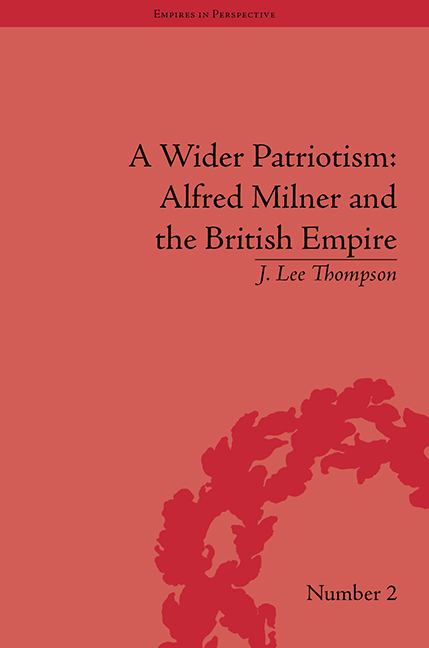Book contents
- Frontmatter
- CONTENTS
- Preface
- Acknowledgments
- Part I A Question about Which I Have Never Been Able to See the Other Side
- 1 Introduction
- 2 Imperial Propagandist: The Press, Politics and Public Opinion
- 3 Cromer and Egypt
- Part II Civilian Soldier of the Empire: South Africa
- Part III Constructive Imperialism
- Part IV Imperialism on the Anvil
- Notes
- Works Cited
- Index
1 - Introduction
from Part I - A Question about Which I Have Never Been Able to See the Other Side
- Frontmatter
- CONTENTS
- Preface
- Acknowledgments
- Part I A Question about Which I Have Never Been Able to See the Other Side
- 1 Introduction
- 2 Imperial Propagandist: The Press, Politics and Public Opinion
- 3 Cromer and Egypt
- Part II Civilian Soldier of the Empire: South Africa
- Part III Constructive Imperialism
- Part IV Imperialism on the Anvil
- Notes
- Works Cited
- Index
Summary
When Alfred Milner was first elevated to the peerage in 1901 as Baron Milner of St James's and Cape Town, he took as his motto Communis Patria: roughly, ‘patriotism for our common country’. By this he meant the wider patriotism of the Empire, the furthering of which became his life's work. A self-declared ‘Anglo-Saxon Race Patriot’, Milner's brand of imperialism has over the years been called social, radical, militant, idealist, constructive, excentric, intermediate, consolidationist and forward.
By the time Milner came of age, revolutionary developments in communications led by the telegraph, improvements in steam navigation, the opening of the Suez Canal in 1869, the completion of the Atlantic Cable in 1866 and the completion of the Australian Cable in 1872 had all linked the Empire as never before. Milner also grew up as Disraeli's 1867 Reform Bill ushered in the modern era of mass politics, abetted further before the turn of the century by the franchise extension and redistribution of 1884–5. While he famously engineered Queen Victoria's willing transformation into the embodiment of empire, Disraeli's second premiership also set Britain on imperial courses in Egypt and in South Africa that would profoundly affect Milner. Though the two men never met, and though he lacked the Prime Minister's political opportunism, Milner nevertheless became a self-anointed ‘civilian soldier of the empire’. No matter the cost in blood and treasure, Milner believed absolutely that whatever measures he took to further his dream of a unified British Empire were justified. As this work will show, this single-minded righteousness often blinded him to the realities, political and otherwise, of events in which he played an important role.
One year before the Suez Canal was opened (and four years prior to Milner's arrival at Balliol College, Oxford), Charles Dilke, a prominent Liberal MP, published Greater Britain (1868), an influential volume that unashamedly predicted future Anglo-Saxon world hegemony after a great racial conflict. This was, Dilke said, all for a higher purpose: ‘the power of English laws and English principles of government is not merely an English question – its continuance is essential to the freedom of mankind’.
- Type
- Chapter
- Information
- A Wider PatriotismAlfred Milner and the British Empire, pp. 1 - 10Publisher: Pickering & ChattoFirst published in: 2014



